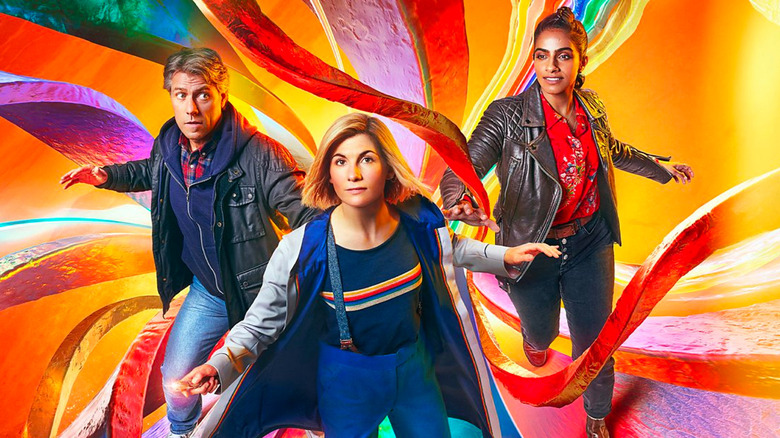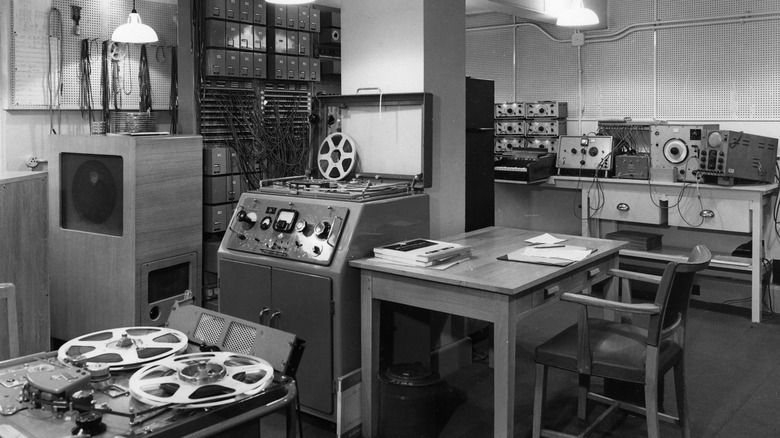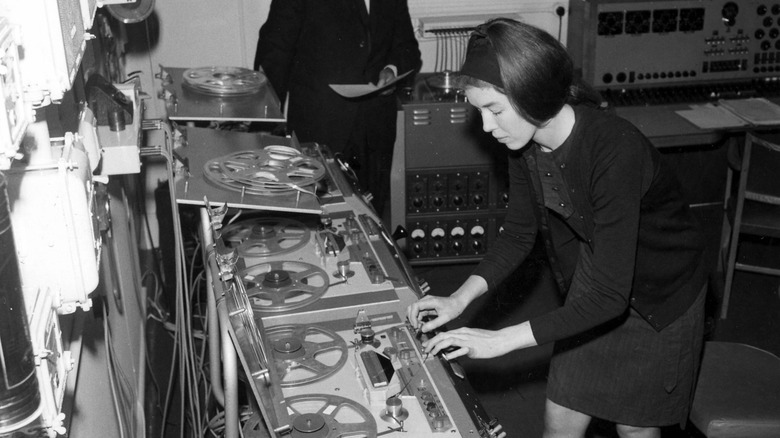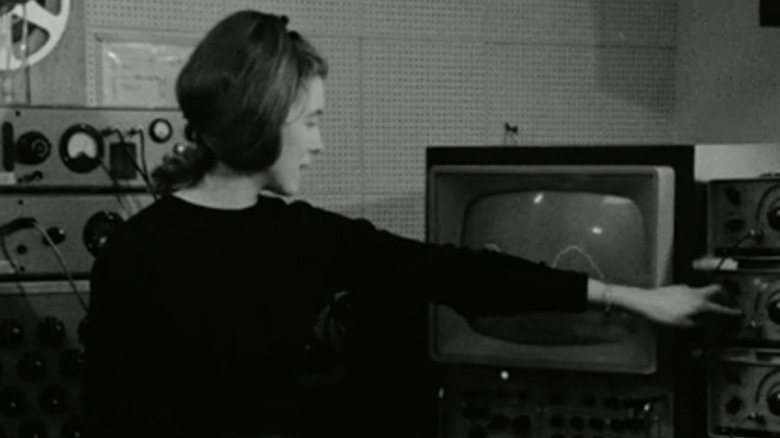Why The Creator Of Doctor Who's Theme Song Went Uncredited For Decades
Swoops, clouds, and wind bubble. if someone gave you a piece of paper with these words or images on it, could you make a song? Maybe. Would it be any good? Possibly. Would it become iconic and change tv and music forever? Very doubtful. But that's exactly what one woman did and I can almost guarantee you've heard her creation. If not, what have you been doing with your life? Change that now.
If the ethereal "Doctor Who" theme song needed to be created today, the composers would probably use synthesizers, multi-track recorders, maybe a couple of instruments, and digitally alter the sounds in an editing program on their computer. Back in 1963, The BBC Radiophonic Workshop, which consisted of one woman and her technical assistant, created one of the most famous theme songs in television history that later inspired musicians like Adrian Utley, Paul McCartney, and Pink Floyd. Yet, you've probably never heard her name because it took 50 years for Delia Derbyshire to receive credit for her contribution to "Doctor Who."
How could that be possible? Well ... allons-y!
'Wibbly Wobbly Timey Wimey... Stuff'
According to the BBC, Derbyshire was born in 1937 in Coventry, England, which was bombed during WWII. The young woman found beauty and purpose in this experience, explaining, "My love for abstract music came from the air raid sirens ... that was electronic music."
Years after the war, she studied music and math, another subject she loved, at Cambridge. After graduation, she applied to Decca Records but was denied because they did not hire women. Although it probably seemed like a huge setback at the time, the rejection led her to work as a studio manager at The BBC's Radiophonic Workshop, which is where she changed history.
The Radiophonic Workshop was the special effects department for The BBC, which meant they created themes and sounds for TV and radio shows. Back in the early '60s, Derbyshire didn't have a library of prerecorded sounds or digital effects on a laptop, so she created them herself using valve oscillators, white noise, and various tones of electronic beeps. The revolutionary things she was doing drew a lot of criticism.
According to The Atlantic, higher-ups at The BBC limited employees' time in the workshop to 3 months, because they worried prolonged exposure to the process might cause psychological damage. This "it'll rot your brain" argument has been made about pretty much every genre of music at some point, but Derbyshire would continue to explore her passions, seemingly unfazed by the criticism.
During her time at The Workshop, she created themes and sounds for over 200 TV and radio programs. The most famous of which is that weird-but-lovely little mix of whooshes, white noise, and electronic beeps that accompany The Doctor.
That timeless theme
Even today, when every kid with a MacBook and Garageband can create electronic music, Derbyshire's theme is instantly recognizable and unique. The pulsing bassline blended with the "waaa-ohhhhs," like The Doctor, has many versions, all of them timeless. We wouldn't have any of them without Derbyshire's revolutionary genius.
Australian composer, Ron Grainer, wrote the theme on a piece of paper, which Derbyshire remembers:
"When I saw Ron Grainer's score, there were some swoops indicated and, I assumed, those were sound waves ... apart from that ... he used words like clouds and wind bubble."
With this piece of paper in hand, Derbyshire and her assistant, Dick Mills, turned words into sounds and, eventually, into music. Clouds became "filtered white noise" and for the wind bubble, she used something called a Wobbulator, which sounds like a piece of The Time Lord's Tardis. Each of the odd little sounds was recorded onto mono tape, physically spliced together, and fed into three separate playback machines. When they wanted to hear it, Derbyshire and Mills would push start on all the machines at the same time, filling the room with that dreamy, slightly weird, revolutionary music all Whovians love.
Reportedly, when Grainer heard the final piece, he didn't recognize it as his own composition, asking: "Did I really write this?" He did, with a lot of help from Derbyshire, who wouldn't be recognized for her work. She was employed as an engineer, which meant she was not entitled to composer credit for her theme. Grainer rejected the idea that he was the sole creator of the iconic music, and fought for her to receive credit with him, but no one seemed to care what he thought.
Derbyshire would not receive on-screen recognition for her revolutionary theme until 2013, 12 years after her death, and 50 years after it first aired on television.
'It's not the time that matters, it's the person.'
Along with her work on TV and radio, Derbyshire is also a respected musician. Some believe her "Doctor Who" theme was as influential to the modern era of music as The Beatles. At the very least, she had a huge influence on electronic music. Portisheads' Adrian Utley compares her musical genius to that of Jimi Hendrix, and claims her theme "changed how [he] felt about the world."
Her techniques and creative vision have inspired other famous musicians for decades. Pink Floyd sampled her theme in their song, "One of These Days," and while this is contested by some fans, you can clearly hear it here. If that's not impressive to you, Sir Paul McCartney approached her about recording an electronic version of his hit "Yesterday." Sadly, that never happened, but she left behind her own catalog of songs for us to enjoy, some of which can still be found online today.
Not too shabby for "an engineer."
By the mid-'70s, Derbyshire had retired from the music business but kept exploring her passion for sound privately. She made a brief public return to the music scene in the '90s, before passing away from renal failure in 2001, over a decade before she would receive the credit she was due.
Although she felt she deserved some recognition, it's impossible to know if Derbyshire was aware of just how large of an impact she had on TV and music. The BBC now acknowledges her contribution to the "Doctor Who" theme and claims it is "possibly the most important electronic music ever made," two things they should have admitted a long time ago.



